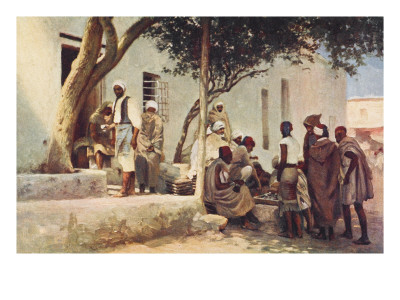One of the great joys of living on my own is the absolute control over my intake of coffee, whether in quantity, quality, or style. It is often something that is either sacrificed when in a tight financial spot, or put aside as elitist, but that's a misunderstanding, pretty much entirely based of Big Boys commercial interests.
Coffee has a great history, and far more varied than what we are led to believe if we only listen to the marketing tricks of either the big commercial brands or such unreliable hacks like St*rb*cks. I intend to provide a general overview of the magic drink and its methods of preparations, useful to anyone who has an interest in the "devil's drink."
First off, some background
First off, lets thank the two major forces that were driving factors in the spread of coffee: Islam and the American Revolution. The berries of the coffee tree were discovered by Ethiopian goatherds who noticed that their charges got pretty wired after consuming those fruits. As a perfect illustration of human inquiry, they decided to try it themselves. Through various experiments, they came up with a pretty basic infusion that certainly did the job. Through some trade and development, the drink made its way to the Arab lands, where its advantages over wine and its effects were noticed; its a lot easier to stay awake studying the Quran when you drink coffee than if you drink wine. It became the officially sanctioned drink of the Islamic world.
The Boston Tea Party had several effects on the general American culture, several of which gave the fledgling nation the opportunity to dissociate itself from its British overlord. The Brits in those days were staunchly entrenched in the consumption of tea, a trade that they used and abused, and taxed to death. Rejecting the Brit's drink, yet still needing a hot pick-me-up, the Colonies looked to the Caribbeans and their roasted beans (also rhum, but that's another story.) American has not looked back since and the "cup of joe" has been a staple of the American Way of Life ever since. Add corporate marketing, colonial influence, a few world wars and tourism to the mix, and you have what we now know as coffee.
Besides its marketing power, the US has another, more insidious control of world coffee: the New York Coffee Market. Until recently, ALL the coffee in the world was handled and traded in NYC in one of the oldest commodity market in the world. All the traders meet there to set prices and manage the market, and you may thank them, the same way you thank OPEC for oil, for the ups-and-downs of coffee beans. Since the 40's there's been various groups pushing for better conditions of workers in plantations, as they are generally paid a meager wage for their work, about a penny a pound. When you consider that your pound of coffee costs you an average of $10, you can see that the guys who do the most work get the short shift.
The fair trade movement strives to offer better deals to the workers by dealing directly with the plantations instead of corporate import-exports. It generally entails that the workers have a better salary and better working conditions; its not perfect, they don't make a fortune, going from a penny-penny-and-a-half a pound, to 3-4-5 pennies a pound. Its still not much, but its still a significant increase, and better working conditions cant be looked down upon. Fair trade coffee is no more expensive than more commercial brands, so if you feel that this is an important choice for you, then look for that certification. If you are not sure if you can trust the label, consider that OXFAM has its own brand of fair trade coffee, so it UN backed.
And what's this thing about the "devil's drink"? Well, back in the days of the Crusades, Christians discovered the drink, and both loved and hated it, as it was a "heathen drink." Pope Vincent III heard the rumor, and being a coffee lover himself decided that "coffee is so delicious it would be a pity to let the infidels have exclusive use of it" and baptized it.



